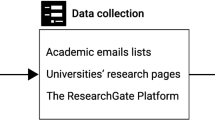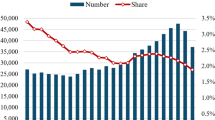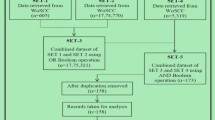Abstract
The number of co-authors has in the social sciences has been rising over the last decades, but a deeper understanding of why this rise is occurring is lacking. Previous studies of co-authorship in the social sciences often refer to the physical or life sciences or anecdotal evidence to explain these changes. This article examines the relationship between changes in co-authorship and research in Danish Economics and Political Science to gain greater insights into whether there are changes in the research or in researchers’ behavior. The analysis shows that articles with empirical research, quantitative research and/or survey are more likely to have a higher number of coauthors than articles based on theoretical, interview, and qualitative research. Furthermore, international and interinstitutional Danish articles tend to have more coauthors than interinstitutional articles. The analysis also reveals that the average number of authors increases for articles with all types of research and research approaches. This indicates that the collaboration behavior of the researchers is changing.






Similar content being viewed by others
Notes
The NJS are calculated in the WoS database maintain by CWTS, Leiden University.
Political Science is fairly broadly defined for the purposes of this study and includes the subject areas Public Administration and International Relations.
References
Adams, W. C., Infeld, D. L., Minnichelli, L. F., & Ruddell, M. W. (2014). Policy journal trends and tensions: JPAM and PSJ. Policy Studies Journal, 42, S118–S137. https://doi.org/10.1111/psj.12051.
Barnett, A. H., Ault, R. W., & Kaserman, D. L. (1988). The rising incidence of co-authorship in economics—Further evidence. Review of Economics and Statistics, 70(3), 539–543. https://doi.org/10.2307/1926798.
Bennett, L. M., & Gadlin, H. (2012). Collaboration and team science: From theory to practice. Journal of Investigative Medicine, 60(5), 768–775.
Biggs, J. (2008). Allocating the credit in collaborative research. PS: Political Science & Politics, 41(01), 246–247. https://doi.org/10.1017/S1049096508280364.
Birnholtz, J. P. (2006). What does it mean to be an author? The intersection of credit, contribution, and collaboration in science. Journal of the American Society for Information Science and Technology, 57(13), 1758–1770. https://doi.org/10.1002/asi.20380.
Brown, C. L., Chan, K. C., & Lai, P. (2006). Marketing journal coauthorships: An empirical analysis of coauthor behavior. Journal of Marketing Education, 28(1), 17–25. https://doi.org/10.1177/0273475305279951.
CERN (2017). The birth of the web. https://home.cern/topics/birth-web. Accessed 3 Feb 2017.
Corley, E. A., & Sabharwal, M. (2010). Scholarly collaboration and productivity patterns in public administration: Analysing recent trends. Public Administration, 88(3), 627–648. https://doi.org/10.1111/j.1467-9299.2010.01830.x.
Cronin, B. (2001). Hyperauthorship: A postmodern perversion or evidence of a structural shift in scholarly communication practices? Journal of the American Society for Information Science and Technology, 52(7), 558–569. https://doi.org/10.1002/Asi.1097.Abs.
Fisher, B. S., Cobane, C. T., Vander Ven, T. M., & Cullen, F. T. (1998). How many authors does it take to publish an article? Trends and patterns in political science. PS: Political Science & Politics, 31(4), 847–856. https://doi.org/10.2307/420730.
Glänzel, W., & Moed, H. F. (2013). Opinion paper: thoughts and facts on bibliometric indicators. Scientometrics, 96(1), 381–394. https://doi.org/10.1007/s11192-012-0898-z.
Henriksen, D. (2016). The rise in co-authorship in the social sciences (1980–2013). Scientometrics. https://doi.org/10.1007/s11192-016-1849-x.
Hoekman, J., Frenken, K., & Tijssen, R. J. W. (2010). Research collaboration at a distance: Changing spatial patterns of scientific collaboration within Europe. Research Policy, 39(5), 662–673. https://doi.org/10.1016/j.respol.2010.01.012.
Hudson, J. (1996). Trends in multi-authored papers in economics. Journal of Economic Perspectives, 10(3), 153–158.
Hunter, L., & Leahey, E. (2008). Collaborative research in sociology: Trends and contributing factors. The American Sociologist, 39(4), 290–306. https://doi.org/10.1007/s12108-008-9042-1.
Jeong, S., Choi, J. Y., & Kim, J. (2011). The determinants of research collaboration modes: exploring the effects of research and researcher characteristics on co-authorship. Scientometrics, 89(3), 967–983. https://doi.org/10.1007/s11192-011-0474-y.
Kumar, S., & Ratnavelu, K. (2016). Perceptions of scholars in the field of economics on co-authorship associations: Evidence from an international survey. PLoS ONE, 11(6), e0157633. https://doi.org/10.1371/journal.pone.0157633.
Laband, D. N., & Tollison, R. D. (2000). Intellectual collaboration. Journal of Political Economy, 108(3), 632–662.
Lariviere, V., Gingras, Y., & Archambault, E. (2006). Canadian collaboration networks: A comparative analysis of the natural sciences, social sciences and the humanities. Scientometrics, 68(3), 519–533. https://doi.org/10.1007/s11192-006-0127-8.
Moody, J. (2004). The structure of a social science collaboration network: Disciplinary cohesion from 1963 to 1999. American Sociological Review, 69(2), 213–238.
O’Neill, G. P. (1998). Authorship patterns in theory based versus research based journals. Scientometrics, 41(3), 291–298.
Ossenblok, T. L. B., Engels, T. C. E., & Sivertsen, G. (2012). The representation of the social sciences and humanities in the Web of Science—a comparison of publication patterns and incentive structures in Flanders and Norway (2005–9). Research Evaluation, 21(4), 280–290. https://doi.org/10.1093/reseval/rvs019.
Piette, M. J., & Ross, K. L. (1992). An analysis of the determinants of co-authorship in economics. The Journal of Economic Education, 23(3), 277–283. https://doi.org/10.1080/00220485.1992.10844762.
Porter, A. L., & Rafols, I. (2009). Is science becoming more interdisciplinary? Measuring and mapping six research fields over time. Scientometrics, 81(3), 719–745. https://doi.org/10.1007/s11192-008-2197-2.
Rutledge, R. W., Karim, K. E., & Reinstein, A. (2011). What factors influence the number of coauthors in the published research of the most productive authors in accounting literature? A long-term study. In V. Arnold, D. Bobek, B. D. Clinton, A. Lillis, R. Roberts, C. Wolfe, & S. Wright (Eds.), Advances in accounting behavioral research (Vol. 14, pp. 191–225). Emerald Group Publishing Limited.
Sacco, W., & Milana, S. (1984). Increase in number of authors per article in ten APA journals: 1960–1980. Cognitive Therapy and Research, 8(1), 77–83. https://doi.org/10.1007/BF01315100.
Schymura, M., & Loschel, A. (2014). Incidence and extent of co-authorship in environmental and resource economics: evidence from the Journal of Environmental Economics and Management. Scientometrics, 99(3), 631–661. https://doi.org/10.1007/s11192-014-1248-0.
Sutter, M., & Kocher, M. (2004). Patterns of co-authorship among economics departments in the USA. Applied Economics, 36(4), 327–333. https://doi.org/10.1080/00036840410001674259.
Wagner, C. S., & Leydesdorff, L. (2005). Mapping the network of global science: comparing international co-authorships from 1990 to 2000. International Journal of Technology and Globalisation, 1(2), 185–208. https://doi.org/10.1504/ijtg.2005.007050.
Waltman, L., Tijssen, R. J. W., & van Eck, N. J. (2011). Globalisation of science in kilometres. Journal of Informetrics, 5(4), 574–582. https://doi.org/10.1016/j.joi.2011.05.003.
Zawacki-Richter, O., & von Prümmer, C. (2010). Gender and collaboration patterns in distance education research. Open Learning, 25(2), 95–114. https://doi.org/10.1080/02680511003787297.
Zitt, M., Bassecoulard, E., & Okubo, Y. (2000). Shadows of the past in international cooperation: Collaboration profiles of the top five producers of science. Scientometrics, 47(3), 627–657. https://doi.org/10.1023/A:1005632319799.
Zutshi, A., McDonald, G., & Kalejs, L. (2012). Challenges in collaborative writing: addressing authorship attribution. European Business Review, 24(1), 28–46. https://doi.org/10.1108/09555341211191535.
Acknowledgements
I would like to thank; Carter Bloch for his many comments during the research process that substantially improved the article; Annette Bruun Andersen for language revision; Jesper Schneider for data extraction; Qi Wang for her help calculating the interdisciplinary variable; Emil Bargmann Madsen for checking some of my coding; Fereshteh Didegah for her comments and being an awesome officemate. In addition to Vincent Larivière, Stefanie Haustein and the rest of the amazing Montreal group for giving me a great environment and comments during the data collection and coding. Finally, I would like to acknowledge the great comments from the referees that help to improve the article.
Author information
Authors and Affiliations
Corresponding author
Appendix
Appendix
See Tables 8, 9, 10, 11, 12 and 13.
Rights and permissions
About this article
Cite this article
Henriksen, D. What factors are associated with increasing co-authorship in the social sciences? A case study of Danish Economics and Political Science. Scientometrics 114, 1395–1421 (2018). https://doi.org/10.1007/s11192-017-2635-0
Received:
Published:
Issue Date:
DOI: https://doi.org/10.1007/s11192-017-2635-0




